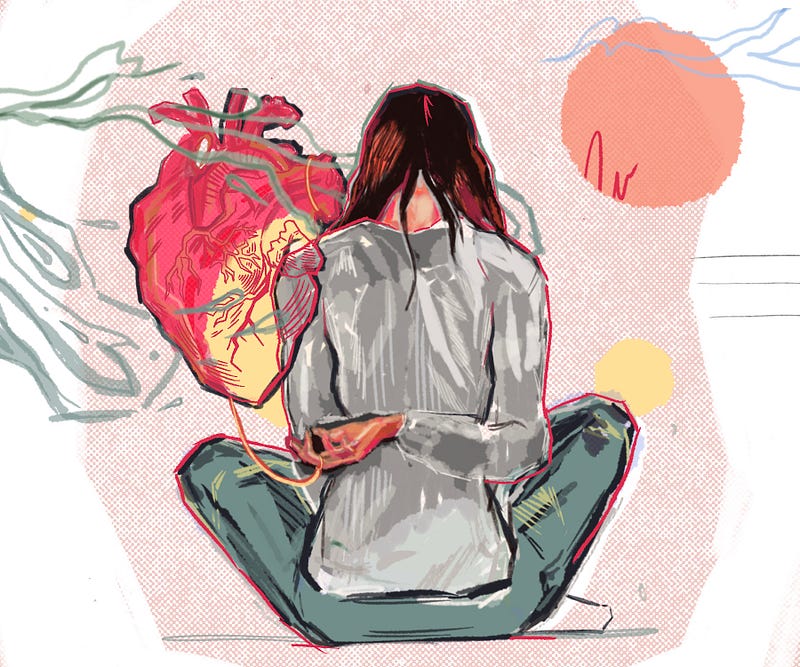A Thank You Letter to Vulnerability

I used to think vulnerability came at a cost and that I was left with weakness, but really, it made me human.
Story by Madison Schoenberg
“I remember the first time you opened up to me about feeling lonely,” my friend, Tessa, said to me over the phone. “I felt like I was literally watching your body convulse as you spoke.”
My body filled with shivers, reminding me of numerous recollections of recent conversations within my relationships that emulated this feeling.
The familiar feeling that prefaces moments of vulnerability; a feeling that I have welcomed into my life, especially in the past year.
It was probably the end of April 2020 — or maybe mid-May — the days seem to blur together. It was sometime after the pandemic had sent our country into lockdown. My roommate left to visit family and she never came back.
The feeling of being physically lonely, which I had experienced a half a year prior while living alone in Seattle, Washington, began to accompany me. Loneliness, along with many other reasons, drove me out of the city and prompted me to move my life to Bellingham, Washington.
I wasn’t going to allow loneliness to become my new roommate.
In order to prevent this, I had to be open to what was uncomfortable. I had to be willing to lean into my current relationship without knowing if it will or will not work out. I had to be willing to ask others, like my friend Tessa, for help — even if I didn’t know what their reaction would entail.
That meant I had to be vulnerable.
By dictionary definition, vulnerability means to be open to being physically or emotionally wounded. This would mean that risk is required to be vulnerable with yourself and others.
Brené Brown is a professor, author and researcher of vulnerability, shame and empathy. Brown spent about six years studying the importance of relational connection before publishing her book “The Power of Vulnerability” and publishing a theory on shame resilience. During that time, she found that connection not only includes, but requires vulnerability. Subsequently, she found that vulnerability is difficult because people are fearful that they are not worthy of connection, which carries the form of shame.
“It’s universal. We all have it,” Brown said in her 2010 Ted Talk, “The Power of Vulnerability.” “The only person that does not experience shame has no capacity for human empathy or connection.”
In Brown’s research, she found that there were two types of people in her study. One group had the courage to have compassion for themselves and others; they knew that vulnerability was necessary to allow them to live wholeheartedly. The other group was fearful of being seen.
In efforts to further push myself toward emotional growth and try to embrace the hard stuff that makes life sweeter, here is an open letter to vulnerability.
Dear vulnerability,
I’m not sure that I want to say thank you to you. You have been on my mind lately and in my conversations with others. I want to like you, but my body shakes in the shadow of you. My chest feels tight and knots develop in my stomach. Thoughts that run through my mind all too fast steal my attention, leaving me unable to signify one singular conclusion.
In my conversations about confusion, I stutter as if I am learning to speak all over again. I am able to speak, despite the difficulty.
In moments of need, I am able to pick up the phone — even if it takes me hours — to ask a loved one to bring medicine, tea or to sit with me.
In moments when I am overwhelmed, I am able to thank the person sitting beside me as my body trembles with anxiety.
When I engage in you to share how I am feeling, I am neutralizing the power of the unknown attached to my being.
I shy away from you, neglecting how good you are to me. I look for distractions and solutions, thinking that they are sufficient replacements for human connection.
I still despise you and the feeling that accompanies you. I feel you as words leave my mouth that I am scared to reveal. I feel you as I replay the words in my head later that day on car rides home from a gathering in which you were present.
Oftentimes, I think about you when I cannot sleep.
And still, I lean into you. I take deep breaths and remind myself that when I come to you, I am not weak, only longing for validity and the ability to live fully.
When you are present, my thoughts do not reign. When you are present, I am not alone.
When you are present, my relationships are deeper. More clearly do I realize that the person sitting across from me is only human, and so am I.
So, I thank you for your relentless presence and assistance, even when I don’t think I need it.
Love,
Madison